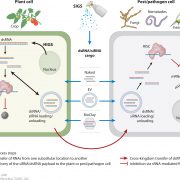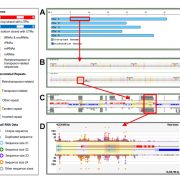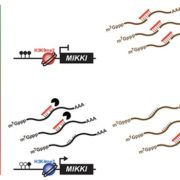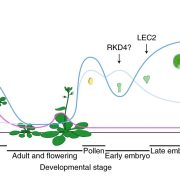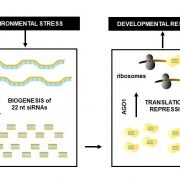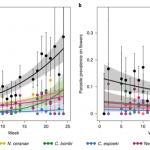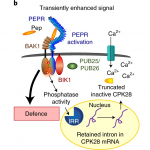The Apple miR171i and its target SCL26.1 enhance drought tolerance (Plant Physiol.)
 Drought is one of the most important abiotic factors affecting plant growth and development. MicroRNAs are a class of small nuclear RNAs (snRNAs) consisting of 21-24 nucleotides, that play critical roles in many biological processes by regulating target gene expression. Apple is one of the most economically important fruits. It’s yield and quality are decreased due to drought, but the role of snRNAs in drought response are not well characterized. By adopting high-throughput small RNA sequencing and degradome analyses, Wang et al. identified various snRNAs and their targets in drought treatment from the ancestral species of cultivated apple, Malus sieversii, which is greatly tolerance to drought stress. A set of 40 known miRNAs and 8 unidentified snRNAs are differentially expressed during short term drought stress in apple. The authors found that miR171i targets and degrades a transcription factor, SCARECOW-LIKE PROTEIN 26.1 (SCL26.1). Overexpression of miR171i in Arabidopsis renders the plants more sensitive to drought, while miR171i knockout and overexpression of SCL26.1 in apple enhances drought tolerance. The miR171i-SCL26.1 module promotes the expression of various reactive oxygen species (ROS) scavenging enzymes, particularly monodehydroascorbate reductase (MDHAR). Overall, this study provides an insight to improve drought stress in apple through the miR171i-SCL26.1 module by increasing antioxidant enzyme activity in the ascorbic acid cycle. (Summary by Min May Wong @wongminmay) Plant Physiology 10.1104/pp.20.00476
Drought is one of the most important abiotic factors affecting plant growth and development. MicroRNAs are a class of small nuclear RNAs (snRNAs) consisting of 21-24 nucleotides, that play critical roles in many biological processes by regulating target gene expression. Apple is one of the most economically important fruits. It’s yield and quality are decreased due to drought, but the role of snRNAs in drought response are not well characterized. By adopting high-throughput small RNA sequencing and degradome analyses, Wang et al. identified various snRNAs and their targets in drought treatment from the ancestral species of cultivated apple, Malus sieversii, which is greatly tolerance to drought stress. A set of 40 known miRNAs and 8 unidentified snRNAs are differentially expressed during short term drought stress in apple. The authors found that miR171i targets and degrades a transcription factor, SCARECOW-LIKE PROTEIN 26.1 (SCL26.1). Overexpression of miR171i in Arabidopsis renders the plants more sensitive to drought, while miR171i knockout and overexpression of SCL26.1 in apple enhances drought tolerance. The miR171i-SCL26.1 module promotes the expression of various reactive oxygen species (ROS) scavenging enzymes, particularly monodehydroascorbate reductase (MDHAR). Overall, this study provides an insight to improve drought stress in apple through the miR171i-SCL26.1 module by increasing antioxidant enzyme activity in the ascorbic acid cycle. (Summary by Min May Wong @wongminmay) Plant Physiology 10.1104/pp.20.00476


